Introduction
Can Guinea Pigs Drink Tap Water: Guinea pigs, those adorable and cuddly rodents that have captured the hearts of pet enthusiasts around the world, are known for their endearing squeaks, fluffy coats, and insatiable appetites for fresh greens. But when it comes to their dietary needs, the of they can or cannot consume often arises. One common query that often perplexes guinea pigs owners is whether these small creatures can safely quench their thirst with tap water. Water is an essential element of any living being’s diet, and guinea pigs are no exception. These herbivorous rodents require a consistent source of hydration to maintain their overall health and well-being.
However, not all water sources are created equal, and the quality of water can vary significantly depending on where you live. This leads to a crucial concern for responsible guinea pig owners. In this comprehensive exploration, we will delve into the intricacies of water to guinea pigs and whether tap water is a suitable choice for these delightful companions. We will consider factors such as water quality, potential contaminants, the of hydration, and alternative water sources that may be more appropriate for guinea pigs.
A clear understanding of how to ensure your guinea pig stays properly hydrated and maintains its health for a long and happy life. So, let’s embark on this journey to unravel the mysteries of guinea pig hydration and determine whether the water that flows from our faucets is indeed a safe and suitable choice for these charming furry friends.
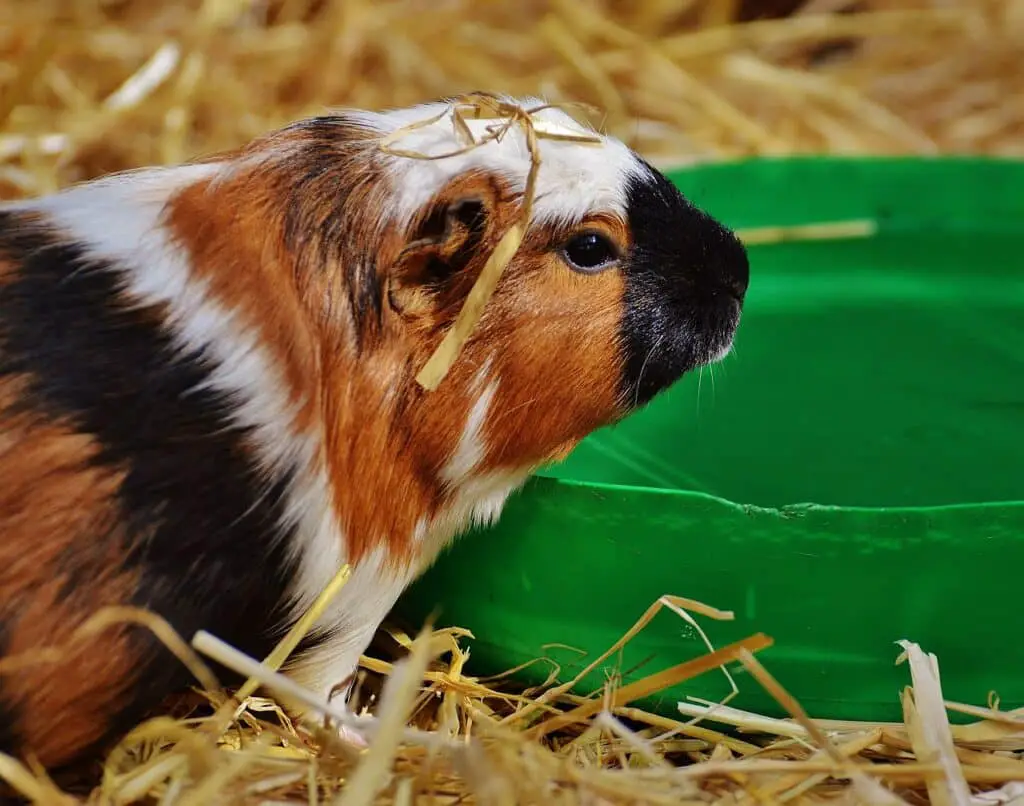
Can guinea pigs have drinking water?
Guinea pigs require a minimum of 80–100mls water per day, per animal. Lactating and pregnant sows will have an increased water intake. When providing water for guinea pigs, inverted glass water bottles with a metal or Pyrex glass cannula are as guinea pigs will chew on, and block sipper- tube waterers.
Tap Water: In many areas, tap water is safe for guinea pigs to drink. However, it’s essential to consider the quality of your local tap water. Some municipalities treat water with chlorine or fluoride, which can be harmful to guinea pigs in large quantities. It’s a good practice to use a water filter or allow tap water to sit for a few hours to dissipate these chemicals before offering it to your guinea pig.
Bottled Spring Water: Bottled spring water is a reliable option if you’re concerned about the quality of your tap water. It’s generally free of harmful additives and contaminants, making it a safe choice for your guinea pig.
Distilled Water: Distilled water is another viable option as it is purified through the process of distillation, which removes most impurities. However, some experts advise against using distilled water exclusively for guinea pigs as it may lack essential minerals.
Well Water: If you have access to well water, ensure it is regularly tested for contaminants. Well water can be suitable for guinea pigs if it meets safety and purity standards.
What can guinea pigs drink water out of?
Guinea pigs should drink water out of a glass or plastic bottle that is specially designed for small pets. The bottle can be attached to the outside of the cage or hutch with a bendy metal fastener or spring fastener.
Natural Drinking Position: Guinea pigs can drink from a bowl in a more natural, head-down position, which some owners believe is healthier.
Easy Access: Bowls are accessible to guinea pigs of all ages, including young and older individuals who might struggle with water bottles.
Chewing Risk: Guinea pigs may chew on, tip over, or soil the bowl, leading to water wastage and mess in their habitat.
Contamination: Open bowls are more prone to contamination with bedding and debris, necessitating more frequent cleaning.
Can guinea pigs drink milk?
Guinea pigs are herbivorous creatures, and because of that, it is avoid ever feeding them any dairy products, including milk, according to the Humane Society of Huron Valley. The furry rodents are lactose intolerant, which means that their bodies simply do not digest dairy items sufficiently or adequately.
The short and definitive answer is no, guinea pigs should not be given milk. Unlike humans, many guinea pigs are lactose intolerant, which means they lack the necessary enzyme (lactase) to digest lactose, the sugar found in milk. When lactose-intolerant guinea pigs consume milk or dairy products, it can lead to digestive issues, including diarrhea, bloating, and abdominal discomfort. These symptoms can be distressing for the guinea pig and may potentially harm their overall health.
While milk is not suitable for guinea pigs, they do require access to fresh, clean water at all times. Water is crucial for their hydration and aids in various physiological processes, including digestion. Guinea pigs typically obtain most of their water from their diet of hay and fresh vegetables. Therefore, ensuring their food is fresh and free of contaminants is essential.
Guinea pigs also benefit from vitamin C supplementation, as they cannot synthesize this vitamin on their own. You can vitamin C-rich foods like bell peppers, strawberries, and kale to meet this dietary need. Some guinea pig owners offer vitamin C drops in their water, but it’s essential to consult with a veterinarian before doing so to determine the appropriate dosage.
Do guinea pigs like baths?
It’s best to bathe your guinea pigs on a day when it’s not too wet outside, so that they can dry quickly afterwards. Guinea pigs don’t enjoy being wet, and in cold climates bathing guinea pigs and not drying them off properly can give them chills, and make them feel very miserable at the very least.
Guinea pigs, those charming and gentle rodents, are cherished as pets for their endearing personalities and low-maintenance care. While providing them with proper nutrition, a clean habitat, and companionship is essential, one common question among guinea pig owners is whether these little creatures enjoy baths.
The reasons for and against bathing, and best practices for keeping your guinea pig clean and happy. That most guinea pigs do not enjoy baths. Guinea pigs are not naturally accustomed to water, and being immersed in it can cause stress and anxiety. Bathing can be a frightening experience for them, as they may feel vulnerable and exposed. The sensation of wet fur can also be uncomfortable, and the sound of running water or the sight of a full bathtub can be distressing.
Guinea pigs are meticulous groomers and are usually quite proficient at keeping themselves clean. They use their tongues and teeth to groom their fur and maintain its cleanliness. Unlike some other animals, they do not produce excessive oils that necessitate frequent bathing. Bathing can be a stressful experience for guinea pigs, and stress can have adverse effects on their health. Frequent bathing can strip their skin and fur of natural oils, leading to dryness and potential skin issues.
Can guinea pigs drink lemon water?
In general the downsides of lemons actually outweigh any good benefits that they may have for your guinea pig. Our best advice is that guinea pigs generally really shouldn’t have lemon. The high amount of acid can cause mouth sores, issues with their teeth, and stomach problems.
High Acidity: Lemons are highly acidic fruits. The acidity can be harmful to a guinea pig’s sensitive digestive system, leading to stomach discomfort, upset, or even potential damage to their stomach lining.
Citrus Content: Citrus fruits like lemons contain compounds that can cause mouth sores and irritation in guinea pigs, making them uncomfortable and potentially interfering with their ability to eat.
Lack of Variety: Guinea pigs have specific dietary needs that include a variety of fresh vegetables, hay, and pellets. Lemon water doesn’t any nutritional benefits that are not already met by their regular diet.
Preference for Plain Water: Guinea pigs are more inclined to drink plain, fresh water rather than flavored or infused water. Offering them lemon water may discourage them from drinking enough water, which is essential for their health.
Can guinea pigs eat cucumber?
Cucumber: Guinea Pigs can eat both the flesh, seeds (not too much) and the skin. Green beans: These contain vitamin C, and can be fed in a raw state. However, be cautious as they also contain calcium and phosphorus. Peas: As with most vegetables, these contain Phosphorus and Calcium.
Moderation: Cucumber should be offered as an occasional treat and not as a primary food source. It should make up only a small portion of their overall diet.
Freshness: Always fresh cucumber to your guinea pig. Avoid offering cucumbers that are spoiled or have started to wilt. Guinea pigs require a varied diet to ensure they receive all the necessary nutrients. Cucumber should be part of a diverse range of fresh vegetables and high-quality hay.
Washing: Wash cucumbers thoroughly to remove any pesticides or contaminants before feeding them to your guinea pig. Offer small, bite-sized pieces of cucumber to prevent choking hazards and make it easier for your guinea pig to eat.
Monitor for Digestive Issues: Some guinea pigs may be more sensitive to cucumber than others. Watch for signs of digestive problems, such as diarrhea or gas, and reduce or eliminate cucumber from their diet if these issues arise.
Can guinea pigs eat carrots?
Guinea pigs don’t naturally eat fruit or root vegetables, but you can give them in small amounts as treats, such as small pieces of carrot or an apple quarter. Don’t give them citrus fruits, and that some plants are poisonous to guinea pigs.
Moderation: Carrots should be offered in moderation, as they are relatively high in natural sugars. One or two small slices of carrot, a few times a week, is an appropriate amount.
Freshness: Always fresh carrots that are free from mold or signs of spoilage. Wash carrots thoroughly to remove any dirt or pesticides. Slice carrots into small, manageable pieces to prevent choking hazards. Young or tender carrots are easier for guinea pigs to eat.
Variety: Carrots should be part of a varied diet that includes hay, high-quality guinea pig pellets, and a rotation of other fresh vegetables like leafy greens, bell peppers, and cucumbers.
Observe Digestive Health: Some guinea pigs may have sensitivities to new foods, including carrots. Monitor your guinea pig for any signs of digestive issues, such as diarrhea or gas, when introducing carrots or any new vegetables to their diet.
Can guinea pigs eat tomatoes?
Guinea pigs can eat any kind of tomato—it’s just important that they’re completely ripe and fed in moderation. The average regular tomato weighs anywhere around 75 to 150 g, and they should only be getting a one inch cube in order to reduce the chances of overfeeding.
Moderation: Tomatoes should be offered in moderation due to their natural acidity and sugar content. One or two small slices of tomato, a few times a week, is an appropriate amount. Guinea pigs should not consume the green parts of tomatoes, including the stems and leaves, as these can be toxic.
Seed Removal: It’s a good practice to remove the seeds from tomatoes before offering them to guinea pigs. While tomato seeds are generally not harmful, they can be a choking hazard for small animals.
Variety: Tomatoes should be part of a diverse diet that includes hay, high-quality guinea pig pellets, and a rotation of other fresh vegetables like leafy greens, bell peppers, and cucumbers.
Digestive Health: As with any new food to a guinea pig’s diet, monitor them for any signs of digestive issues, such as diarrhea or gas, when introducing tomatoes.
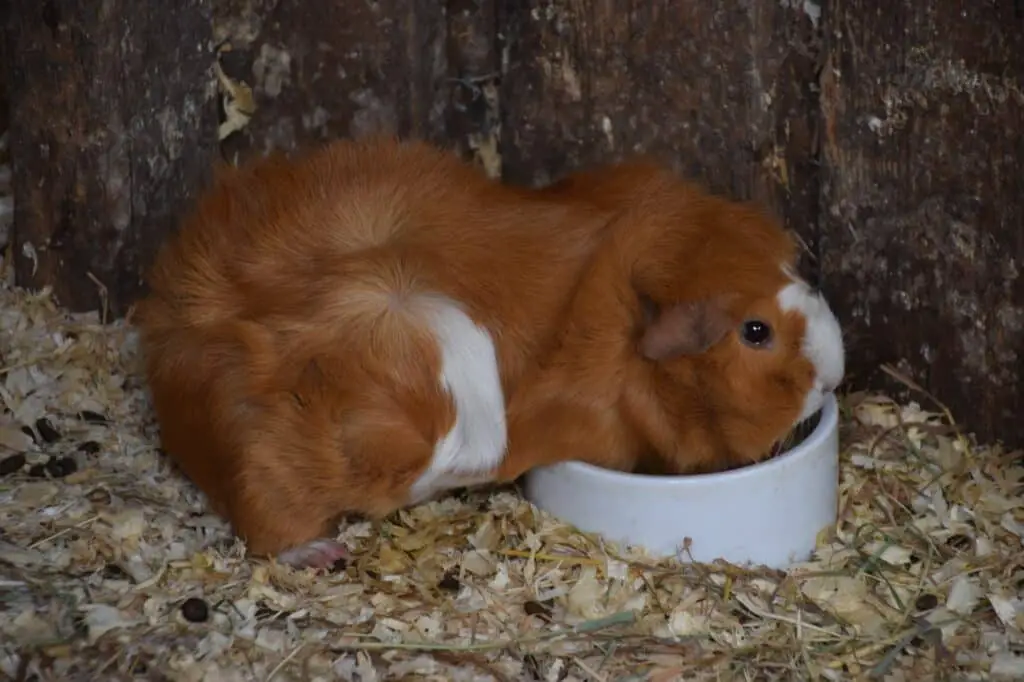
Conclusion
Guinea pigs can drink tap water is a multifaceted one, and the answer ultimately depends on your location and the quality of the tap water in your area. Here, we’ve the key considerations that guinea pig owners should keep in mind when deciding on a water source for their beloved pets. First and foremost, the safety and health of your guinea pig should always be the top priority. Many municipalities treat tap water to make it safe for human consumption, but the presence of chlorine, fluoride, heavy metals, and other chemicals in tap water can pose potential risks to guinea pigs. These chemicals can have adverse effects on their delicate digestive systems and overall well-being.
Therefore, it’s crucial to research the water quality in your area and, if necessary, take steps to purify or filter the tap water to make it safe for your furry companions. One option to ensure your guinea pig safety is to use a water filter designed for removing impurities from tap water. This can help eliminate harmful chemicals and contaminants, making the water more suitable for your pet’s consumption. Alternatively, you may consider using bottled spring water or distilled water, which tend to be purer and have fewer additives than untreated tap water.
In some cases, well water may also be a viable option, it has been tested for safety and purity. However, it’s crucial to ensure that well water is regularly tested for contaminants that could affect your guinea pig’s health. Ultimately, while tap water can be a convenient and cost-effective choice for guinea pig owners, its safety hinges on water quality. To make an informed decision, research your local water quality reports, consider using water filtration methods, and consult with your veterinarian for personalized recommendations based on your specific location and your guinea pig’s individual health needs.

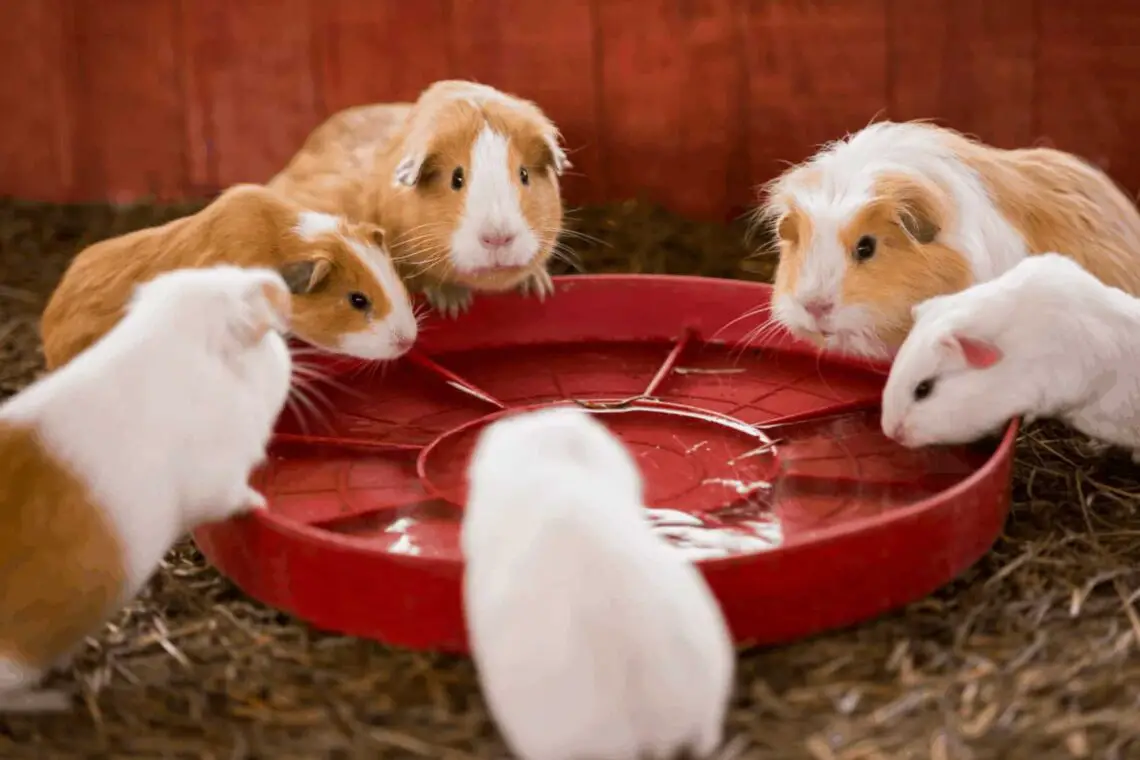

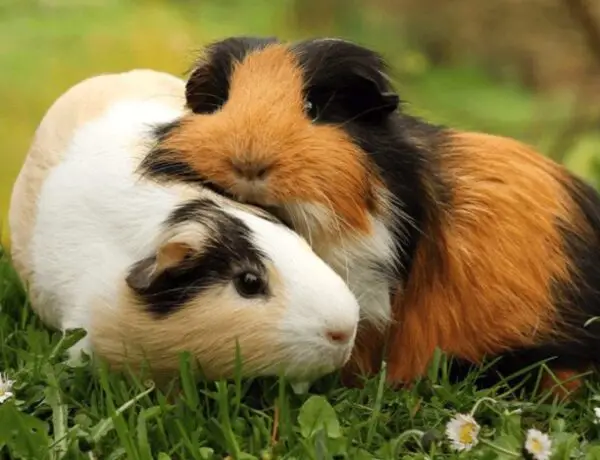
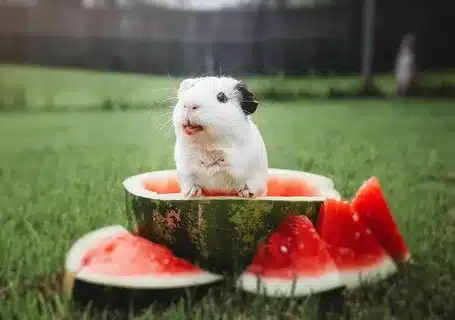
No Comments